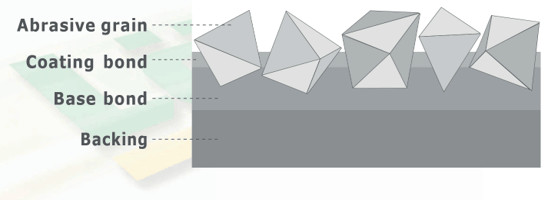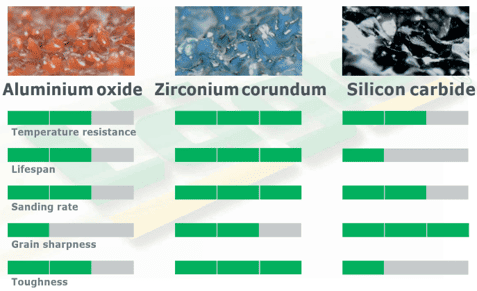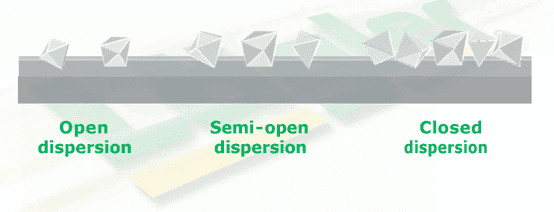You are here:
Most abrasives are produced for other industries or for stationary belt sanding machines. These machines are mainly used to sand raw wood at a set speed, RPM and pressure. Those abrasives are then converted to sand hardwood flooring.
Our approach is different.
We know that our customers face challenges with raw wood, factory prefinished wood, on-site refinished wood and endless types of finish. Our machines offer variation in pressure settings and individual machine RPM, as well as personalized walking speed, which affects the sanding pattern. For this very reason, only the best abrasives could be paired with our machines. The LÄGLER® team tirelessly researched to find the right backing, minerals for abrasive grain, coating bond and base bond for our abrasives to get consistently premium results for premium floors.
Choosing the right abrasive is one of the most important decisions in achieving a premium surface. Proper matching of the backing, bond and abrasive grain is particularly important for a high quality abrasive.
Backing serves as the base for the abrasive grains and the bonding system.There are generally two backing variations- textile and paper. The greater the loading caused by the sanding process, the more resistant the backing needs to be. The bond fixes the abrasive grain to the backing. A distinction is made between the base bond, which anchors the grain on the backing, and the coating bond, which connects and stabilizes the grains together. Depending on the area of application of the abrasive, softer or harder bonds are used. Generally in the wood sector, synthetic resins are used as bonds, which have a very high resistance to heat.
Abrasive grain consists of hard cutting materials that ensure material removal. The size and dispersion of the individual abrasive grains, as well as the type of cutting material, play a critical role.

Aluminum Oxide (Red/Brown)
Aluminum oxide, also known as corundum, is hard and has a high temperature resistance. Due to its hardness, as machining time increases the cubic grain becomes increasingly round and relatively blunt. This process happens fairly quick, resulting in a shorter service life.
Zirconium Corundum/Zirconia (Blue)
Zirconium corundum is very tough and is also extremely temperature resistant. This gives it a very long service life, which in turn minimizes costs. Zirconium corundum has a self-sharpening effect owing to its microcrystalline structure. Due to this structure, during the sanding process small parts break out of the grain again and again. This results in new cutting edges which keep the grain sharp for longer periods. The microcrystalline wear ensures aggressive sanding and lasting sharpness, which in turn extends the entire service life of the abrasive.
Silicon Carbide (Black)
Silicon carbide abrasive grains are wedge shaped and pointed. They are sharp edged and very hard, making them extremely aggressive. Therefore, silicon carbide is used in the wood sector mainly for very coarse grit sanding. In fine sanding, silicon carbide is almost exclusively used for sanding screens. Since silicon carbide is relatively brittle, the individual grains wear away faster than other minerals.

Abrasive dispersion affects the sanding pattern through the cutting and removal process.
The grain is usually applied with an electrostatic scattering process in such a way that the respective tips are all aligned upwards. This ensures a high initial cutting performance. In the production of abrasives, the respective grain size can be dispersed in different densities: open, semi-open or
closed dispersion. Abrasives with an open dispersion achieve a high abrasion rate, but exhibit a certain aggressiveness that can have a negative effect on the sanding pattern. In order to avoid the high, punctuated aggressiveness of the open dispersion and the associated sanding marks, the grains are placed close together on the abrasive. This means that the aggressiveness is no longer localized but instead evenly distributed over the entire abrasive surface.
In order to meet constantly growing customer demands, LÄGLER® prefers closed dispersion in the production of abrasives, especially on medium and finer grits. This ensures optimal aggressiveness while simultaneously leading to a uniform sanding pattern.

Want to try LÄGLER® premium abrasives for yourself? Click here to purchase.
Lägler North America, a division of Palo Duro Hardwoods, is the North American distributor of machines and parts manufactured by Eugen Lägler GmbH in Germany. We are North America’s machine repair center, and offer Lägler’s one-day Premium Sanding Technology (PST®) certification course.
Copyright © 2020 Lägler North America. All Rights Reserved.